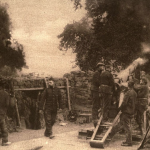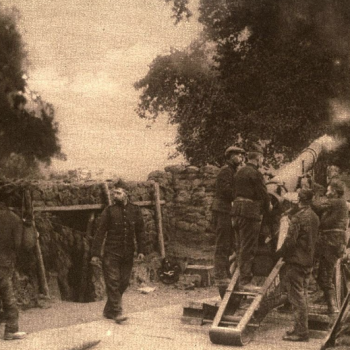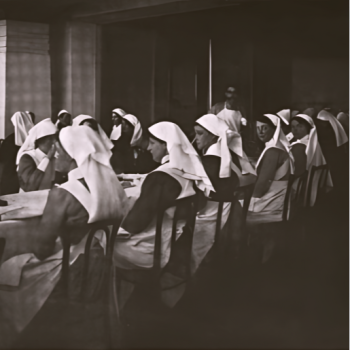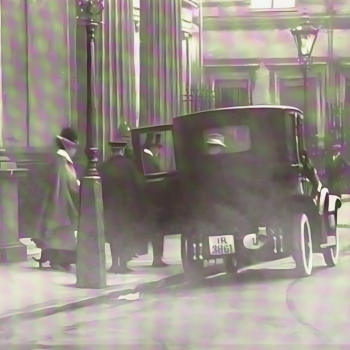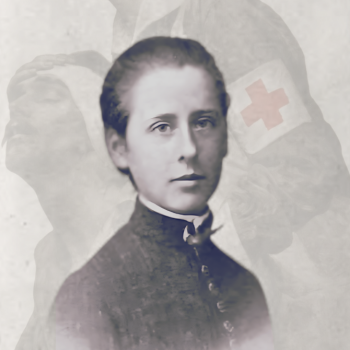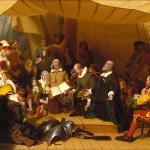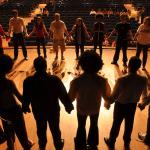PART V
LIFE IN OCCUPIED BELGIUM
After that terrible night when the Germans had come to the Château d’E——, there were, of course, the bitter and galling readjustments to the new conditions which their coming necessitated. I saw little of this myself, however, for as soon as full daylight had flooded the house, and we were set at liberty from that closed chamber of death; as soon as the poor dead boy had been laid to rest in the garden—Félix dug his grave there, though we had to ask permission to have even this done—I began to make plans for a return to Ghent. My duty was, of course, with my unit—if indeed it still existed—and there was no time to lose. It was hard to say good-bye to Madame de R—— and her sister, after all that we had just lived through together, but already I was learning one of the great lessons of the War: individuals came and went, in and out of your life, as though they were passing in and out through an open doorway. They might be intimately and vividly near to you for a day or a week; then, out through that door they would go, perhaps at a moment’s notice—out and away. The vast conflict swallowed them up as completely as it had swallowed you: of what account were individual lives or concerns at a time like that? Each man had stepped quickly into line as his name was called; he was drafted as quickly into another line when his hour had struck; and perhaps you never saw him again. You had your memories of your old comrades; those with whom you had toiled and striven; but when you were in the heat of some fierce, new struggle, even these became ghostly, unreal, at times. A long procession of ghosts the War has left with us who were in it—ghosts of the dead, ghosts of the living; they come trooping back as we summon them; for a fleeting moment we look once more into their eyes, and we know that all of them are dear, yet we know too that they move silently, as parts only, of the one great whole, and that, in the larger sense, there were no individual lives— there was only the War.
Of course, it was not altogether a simple matter to get back to Ghent, as there was now no direct means of transport, the Germans having taken possession of everything; but I did manage it somehow, walking part of the way. No sooner there, however, than it became quite evident that work with my unit was over, for the obvious reason that, with the coming of the enemy, the unit itself no longer had an official recognition; it had, in fact, already been unceremoniously suppressed, and there was no prospect of reorganization on a different basis. I came to a swift decision therefore, determining to return to England and make a fresh start. After all, I had left London at a few hours’ notice, and while I had been gone barely a fort night, so much had happened in those two weeks, that I felt a fresh start would not be altogether unwise, especially as, with Belgium still in view, I hoped the next time to make a long sojourn.
After a short stay in London, therefore, and an uneventful journey to Holland (the Belgian coast was now, of course, closed) I found myself— feeling quite like a War veteran by this time!—once more “inside the lines,” depression and fear, like a thick cloud, had hung about the frontier, and as we had crossed it, our train gliding first past the Dutch sentry boxes, then past the German; as we had left free Holland and slid into occupied Belgium, it was as though heavy iron doors had clanged to behind us, sharply severing us from all that had been familiar and dear in life up to that time. I cannot describe the sense of finality, of irrevocableness. The moment the frontier was behind us, there was of course a most thorough inspection of papers and of luggage, and I remember that the German officials, hard and rough, made me think uncomfortably of stone-crushing machines. German soldiers were everywhere busy “keeping order,” just on general Hunnish principles, so far as I could see, for there appeared to be no tendency whatever to disorder. As I looked, I wondered which of them (or if all) had been guilty, only yesterday, of abominable atrocities—and at the same moment I noticed with a shock that their belt buckles were all engraved in large letters with the device: “Gott mil tins!” I found myself staring at it, recoiling from it, but I could hardly have told you whether it was the irony or the blasphemy which seemed the blacker. Stopping that night at a hotel in Antwerp, I have a clear memory of a most amazing spectacle of crowds of superbly uniformed German officers, with closely cropped, square heads, and literally covered with decorations. I had never dreamed there could be so many iron crosses in existence. The hotel lobby and all the corridors swarmed with these men—rather magnificent looking barbarians they were—and they strutted about arrogantly and with an offensive air of possession which, foreigner though I was, aroused my bitter indignation. What the Belgians must have felt, I could not bear to think. At dinner that night, in the large dining room, I remember hearing for the first time, what became so familiar later— the Prussian toast, coined, someone told me, when War was first declared; “Der Tag!” At that time, they thought “The Day” was not far off, a matter of a few months only— the day when they would hold the world in the hollow of their hand—and I can still see the insolent and boastful way they flourished and then touched their glasses, bowing over them and smiling exultantly. That evening in Antwerp gave me my first clear idea of what life in occupied Belgium was going to be.
Though my “official excuse” for going again into Belgium had been some work, of which I had heard, in the little village of M— to the east of Antwerp, I decided, nevertheless, to push on to Brussels, and make my real beginning (wherever it was foreordained that I should end!) from there; and, arriving without mishap, my first duty was, of course, to report at the Kommandantur. I had flattered myself that nothing done by any German could surprise me, but I was mistaken; for, thanks to the secret service, everything about me appeared to be known already. The officer in charge of the particular bureau to which I was directed, was a super-dreadnought kind of man who, the moment I gave my name, said:
“You have been working in Ghent recently.”
“Yes,” I answered, a little taken aback at the suddenness of his identification; “why not?”
He made no answer to my question, but, turning on me rather a piercing look, continued:
“You have just come to Brussels almost direct from England. You are intending to go to the village of M— beyond Antwerp. That is near the frontier. Why do you want to go there?”
This amused me—I was such a “greenhorn.” It had never entered my head that when in enemy territory, to choose to sit down near a frontier just “was not done” by those who were wise. But I had not even yet really grasped the significance of what he was saying.
“Why on earth shouldn’t I go near the frontier?” I asked lightly. “What is the matter with it?”
He glared at me.
“You are in Germany,” he snarled.
“I am in Belgium,” I retorted, too indignant to keep silent.
“You are in Germany!” he thundered, and if there had been rafters to that room, they would have echoed.
There was one thing I was more afraid of than any other—that I might give the Germans the right to put me out of the country. They had the power to do so, and I had been warned that this had not infrequently happened to imprudent travelers. But I did not intend to furnish them with an excuse. Moreover, there had, of course, been nothing in that embryonic plan of mine to go to the village of M—, which they were not quite welcome to know all about, and I was beginning to wonder if they did not, perhaps, know more about it than I did myself. I ended the matter, at least temporarily, by remarking, with as much of an air of indifference as I could assume, that it now looked as though I should remain in Brussels and work there, certainly for the present, and I left the Kommandantur without further difficulty. Curiously enough, I completely forgot, until long afterwards, that first experience of mine with the German secret service.
It soon became evident that the life now opening before me was to be a very different one from that which I had passed in Ghent; that while I was still just as much in Belgium, and really not so many miles from the scenes of the earlier work, I might have been on another planet. While working in Ghent, I was in the midst of splendid movement, of kaleidoscopic change, of daring, of adventure and of achievement; now, I realized, I was entering on a phase of the War which was calling out very different qualities from the heroic little country—fortitude, in the face of the most monstrous and abominable injustice; endurance, when there was not a glimmer of light ahead; hope, when there seemed literally no hope in sight; faith, never faltering, in ultimate victory. The Belgians at home were making in their way, the same splendid and determined stand against the Germans of the occupation, as their invincible little army was doing in its field; and while they were being called upon for the display of a far different kind of courage, it was, perhaps, a kind more rare than that which faces death in the heat of battle. It would be very difficult adequately to describe the atmosphere of the occupation, as little by little I came to appreciate it; its peculiarly insidious character; the strange, contradictory emotions of the Belgians: the gaunt fear, which, despite themselves, gripped at the hearts of many of them; the indomitable courage with which this creeping dread was faced; the magnificent way they trampled it under foot. The Germans never lost an opportunity to humiliate them, to harass and torture them. They imprisoned them without the least justification; they deported them for refusing to work for their “conquerors,” and so against their King and their country; they shot them by hundreds, almost without trial, and certainly in most cases without excuse. It was the “cat and mouse” horror; the tyranny of the strong over the weak—a form of cruelty, ancient as the hills, but peculiarly “refined” as practiced by the Germans. Yet the Belgians met all their trials with a mocking, and only slightly veiled defiance; a kind of reckless indifference which left you mute with admiration. One of the finest things in the War was the way the Belgian people, through all the grinding miseries and heartbreak of the occupation, kept their spirit and their interior independence. The way they behaved towards the Germans in public was really a work of art. They treated them with an ill-concealed, half-humorous insolence, most refreshing to see ; passing them as though they did not exist, or with an over-emphatic courtesy which threw ridicule upon them, without giving even a German the excuse to retaliate; and if the Germans (as was evident) were trying to crush the spirit of Belgium, even they might have seen (if they had had the wits to look) that from the very first their task was hopeless. But the Germans never saw anything which they did not want to see, and because they closed their eyes to the real situation, they merely defeated their own ends, and though Belgium was “occupied,” it never was conquered.
Naturally I lost no time in trying to find work to do, and I had not been mistaken— there was plenty. Just at first it was, of course, odds and ends, anything that came my way; but before long I had the great good fortune (the result of a kind word on my behalf, by someone who was able to pull a wire) to be admitted as infirmière, on night duty, in the Hospital of the Royal Palace—the Hospital which the Queen had installed at the very commencement of hostilities, and which had been kept open and smoothly running after the Government and the Court had moved to Antwerp. It had from the beginning been a dream of mine to work there, though I saw little chance of doing so, but the dream came true, none the less. It was a splendidly equipped hospital, in a magnificent setting. The main portion of the building had been given up to it; the great Galerie des Fêtes, with the seemingly endless rows of small, white cots stretching off into misty distances; with its brilliantly decorated walls, and lofty, gold-embossed ceilings from which hung enormous crystal chandeliers, being only “one of the wards.” The vast Salle de Bal was another, and you reached the smaller wards from these. The first wound ed had been received as early as the middle of August, and they had been coming and going ever since. At the time that I started my duties, allied or enemy wounded were alike mercifully admitted— Belgian, French, English and German. Of course, all save the German wounded were prisoners of war, and so at any moment were liable to be carried off to Germany, and this was one of the most painful aspects of our hospital life. As our men healed toward convalescence (or even before), would they be taken away from us, and sent to some distant and dismal internment camp? We got so fond of our men, nursing them back to life, day by day. A wounded man is so dependent on you, if his hurts are grievous; he turns to you for the least thing, and often I found myself, with a lump in my throat, hoping that mine, at least, would not get well too fast.
Picking up one of the many threads of my memory, therefore, I am taken back to a certain night when, for the first time, I learned why the youthful occupant of one of the beds in my ward, lay for hours at a time, staring into darkness, with sleepless eyes, in an agony of silent, inner conflict, which nothing seemed to still. For weeks he had lain there, on that narrow, hospital beef; only semi-conscious at first; with white, drawn face, where that awful look of mingled youth and age was already indelibly stamped—a familiar look to us since the War had come; emaciated, for he was paralyzed from the waist down; his lips sometimes moving as though he were trying to speak, yet almost always relapsing again into silence. Sometimes at night, though, when everything in the ward was so quiet that he fancied himself alone, I would see him throw an arm out as if to shield someone, and once I heard him cry: “Non, non…Jésus…non!” I used to tell the head nurse about this, but she seemed as puzzled as I how best to help him. No doubt she consulted the doctors in charge, and we moved him to a far corner of the ward, hoping to give him greater quiet, but it seemed to make little difference. The head nurse told me that they knew he had been in some way connected with the horror of those August days when the massacres at Dinant took place, but no one seemed to be sure of the facts. It was my habit, when my duties in preparing my men and my ward for the night were over, to go and sit beside him, as he lay there with those wide-open eyes, seeing some dreadful sight, I knew. Hours on end I used to sit there. At intervals through the night, I would, of course, make tours of my ward, to see that all was as it should be, or in response to a moan from some other bed: “Sapristi! Quelle misère!” escaping between clenched teeth; or the familiar: “Ma sœur, j’ai soif!” Then I would hasten with a glass of water, beat up a pillow or two, or take a temperature, but I always hurried back as quickly as I could to that boy (he was little more than that), with the drawn lips and the sleepless eyes for even when he was given narcotics he did not seem really to sleep. My medical responsibilities amounted to very little; it could not have been other wise since I was in no way a trained nurse— that, of course, is why I had been given night duty. There were no dressings, no operations or other technical matters, but at least I could watch, and I was learning something which concerned me far more than the amputation of arms. So, night after night, I used to sit beside this boy until the daylight came, when his eyes would some times grow heavy, as though, now that the darkness had gone, he dared to close them.
At last, one night, when the ward was specially still, to my surprise he spoke to me, gravely, and in a quiet, level voice.
“You have sat here many nights beside me, ma sœur. You have been kind.”
“I have always hoped that you would sleep,” I answered. “Don’t you think you could sleep now? Try!”
But he shook his head. “By and bye—perhaps,” and he looked away from me quickly.
I waited; I knew he wanted to say more. Presently he turned his head again.
“You are not Belgian,” he said, “but do you know our country? Do you know Dinant?”
“I have never been there,” I told him, “but I have always heard that it was beautiful.”
“Yes, it was beautiful,” he answered, “and it was my home.”
His bed was, fortunately, at some distance from the rest of the wounded; so, his speaking could not disturb them in the silence of the night, and he continued, still in the same level voice. I was glad he was speaking, at last, for I felt that nothing would ease him so much.
“We were guarding both banks of the Meuse overlooking Dinant—we and the French— those days of August, and my regiment (I am of the Chasseurs) was there. This seemed like good fortune to me because, being of Dinant, I liked to have a hand in defending my own town. But I was taken prisoner, with others, and we were crowded into a kind of enclosure thrown up by the Germans, just behind the lines, and were left there with few to guard us, while the fighting went on for days. We heard our cannon booming from both sides of the river, and the German artillery answering furiously; the fighting must have been desperate. I was wounded in my right arm; it had not been properly tended and had become very painful; but early one night, under cover of darkness, I managed to make my escape, and to get into Dinant (I knew all the country round about so well, you see,) and to my own home, where my wife and our baby and my old parents were. You can imagine their joy at seeing me, thus unexpectedly. I intended, of course, the next day to get back to my regiment if I could, but I did not then know that already our brave allies, the French, had been forced to abandon one bank of the river, and that our town was doomed. It was toward morning, and my wife and I were still sitting there, making our plans for the future (for I had not seen her for what seemed a long time, and I did not know if I should see her again,) when suddenly, in a neighboring street, we heard the sound of rapid firing, and then a rush of heavy feet pouring into our own street. We had had no warning at all. I peeped through the shutters—daylight was just coming—-and saw to my horror that we were in a trap. It was the Germans. At the same moment, my old parents, roused by the furious noise, came hurrying into the room, and I saw my wife holding out some civilian clothes to me, imploring me to change. But I could not. My uniform is my country’s; I had not the heart to abandon it. Outside, the noise in the street grew into an uproar; huge military cars, filled with soldiers who were shooting right and left, aiming at nothing but hitting everything, came dashing through it. They all seemed to be intoxicated, for they shouted and sang as they tore by. Then I saw that the Germans who had first swarmed into our street, were breaking open the doors of some of the houses, and that other houses were being set on fire. Our turn would come soon, I knew. I looked at my wife; she had snatched up our baby and was holding him tight to her breast. I looked at my old father and mother, and they were praying. The Germans had, of course, removed my rifle when they took me prisoner, and I was unarmed; but I remembered a heavy club which I had owned before the War, and I ran and got that. I could not use my right arm, which was hanging limp and useless, but I hoped I might manage to strike with my left. ‘Be ready,’ I cried, ‘and follow me wherever I go.’ By this time, many of the civilians in our street were rushing from their houses, driven out by smoke and fire. I saw that men, and women, and children alike, were being shot down as they ran, or that they were being herded together in crowds, evidently to await a more lingering death—you see we had heard how the people of Vise had fared, so we knew what to expect. I saw Germans standing about, laughing. For them it was a carousal. I gripped my club tighter—I knew our moment had come. A second later, I realized that our house, too, was on fire, for great clouds of dense smoke came pouring over us, and, at the same time, I heard them at our door, pounding with their axes to force an entrance. It gave way, and I rushed at the first German who entered, and dealt him such a blow on the head that he reeled and fell backwards. I shouted to my wife: ‘Get out of this, all of you, if you can,’ while I tried to smash the next man. I saw my old father and mother run into the street where they were shot as they ran. My old mother did not die at once; she begged for mercy—so they beat her on the head, as she lay there, and I saw her brains splash out on the stones. I saw my wife rush past me, holding our baby; I saw a huge German tear him roughly from her, while two others seized her, and then the most horrible thing that can happen to any woman, happened to my wife —you understand? Those men attacked her, while others stood by and laughed— yes, again that night I saw them making merry, as though at a kind of feast—and I was powerless to help, for by this time I was pinned against the wall of our house by four or five other Germans, and I could not move. God! how I struggled to get free, to save her—not ten yards away. I saw it all. And then they killed her; they ran a bayonet through her, twice, three times—and she died. I saw her die; without a word she died, though I called and called to her. And I saw the huge German who had snatched our baby from her, lift him high in the air, and choke him—yes, choke him with those great hands of his; and then he tossed him away with his little broken neck, as you would throw away a glove. I saw it with these two eyes of mine— and I could do nothing. Those men held me there, pressed against the wall of our burning house. And then they shot me. I suppose I fell, and they thought me dead— I do not know; I remember nothing more until I found myself here. That is all. From the first moment that I regained conscious ness, I have had but one desire— to avenge that hideous outrage, those monstrous murders, and, paralyzed though I am, I still hope, for I see that sight always, and my God! may I never forget it!”
Once more he lapsed into silence; once more those sleepless, wide-open eyes stared into the night— but his tale was told. Yet, as though he must drink the last bitter dregs of his bitter cup, he was, before long, taken away to Germany with others, as a prisoner of war. Why they should have taken him a paralytic, I never knew—but they did. One night, without any warning whatever, a German officer in command of a few soldiers arrived, and informed the hospital authorities unceremoniously that the men on the list which he brought, must be given up at once. There were emphatic protests, of course, but they were useless. The nursing staff was quickly notified, and we had, as quickly, to prepare our poor wounded for their cruel journey. No one knew where they were to be taken, and that was perhaps the hardest part of it. Two men from my ward went that night, and the boy from Dinant was one of them. As the head nurse and I worked over him, I watched to see if he had any final thing which he wanted to say, but he only thanked us gently for our good care—though I saw that his face was firmly set. Then, into the dimly lit ward, usually so quiet and still at that hour, came the heavy and unheeding tramp of feet; we lifted him carefully from his bed, and the last I saw of him he was being carried away by two thick-set German soldiers, on a narrow German stretcher. I have often wondered if those sleepless eyes of his are now mercifully closed for good—but I have never heard.
Life in the Hospital was very much of a routine. Each night I went on duty at seven o’clock; each morning I went home about eight. In the after noon I would go for a walk, to see something of the War-time life of Brussels, or to the house of some acquaintance, and so back to Hospital duty at seven. There was little change. We had our celebrations at the Hospital—Christmas came, and the New Year, bringing visitors and flowers and what cheer we could summon. We had our “parties”, when there was singing or reciting for the men; we had “parties” of a different sort when, toward the spring, the Germans, not infrequently, used to come and inspect us; but I think the most interesting event of all (perhaps chiefly because of something unusual which happened in connection with it) occurred on the 18th of June, 1915, when the hundredth anniversary of the Battle of Waterloo was celebrated. The Germans had announced, tactfully, that the chief event of the day would take place early in the morning, directly in front of the Royal Palace, when Governor General von Bissing would address the Army and the German civilian population then resident in Brussels. From the windows of the Palace there was a perfect view of all that went on, though we had, of course, the strictest injunctions from the Hospital authorities, to avoid being seen by the Germans—a somewhat unnecessary caution, as the last thing we wanted was to give them the satisfaction of supposing that we were paying any attention to them. My duties for the night were really over, but I could not leave the Palace without getting involved in that crowd of Germans, which was beginning to collect outside, so I decided to stay where I was until after the ceremony.
It was a wonderful, sunny morning, and as the various regiments picked for the occasion, swung into the Place des Palais from the Rue Royale, with colors flying and military bands crashing, and then finally came to rest, massed in solid formation, it was really quite an imposing sight. I remember the arrival of the Imperial Guard, in gorgeous scarlet and glistening white, and tall, white-plumed helmets, shining brilliantly in the sun; the magnificent black horses they rode, the smooth, glossy black coats making a fine contrast with the vivid color of the uniforms. Hundreds of German school children, standing in a dense crowd to the left, had been transported from the Fatherland for the occasion—this was what the Germans always did; whenever there was an “historic fête,” you found young Germany present in force. The German residents of Brussels, also a dense crowd, balanced the children on the right. I doubt if there was a single Belgian to be seen anywhere near the spot, for, not only on their own account would the Belgians wish to ignore this German demonstration, but particularly would they wish to do so on account of their allies, the French. When everything was ready, we saw the gates of the lovely little Park, directly opposite the Palace, swing open; von Bissing, with members of his staff, came out into the Place des Palais, and, mounting a platform erected for the occasion, he began his address. We could hear his voice, but we could not hear what he said. There was the usual applause, and the address came finally to an end. This was all outside the Palace. Inside, something was brewing of which I knew nothing, though, as a matter of fact, it concerned me rather particularly. I had been standing off to one side, a little apart from the rest, by one of the folding doors which opened on to the long, wide balcony at the center of the Palace façade—the balcony used for all State occasions, which directly overlooked the German ceremony now in progress below. No one was supposed to go out there, of course, as long as that ceremony lasted; so, it was with great surprise that I saw one of our wounded men (he was one of mine!) shoot suddenly out from somewhere, hobble quickly over to the balustrade, raise his tasseled, military cap in the air, and—
“Vive Napoléon! Vive l’Empereur!” I heard him shout.
For a moment, I could not believe my ears, nor could I move, so amazed was I, and so delighted; but, of course, as part of the Hospital staff, I was in honor bound to assist in maintaining order (especially so, since the man belonged to my ward), and nothing could have been more contrary to order than this glorious insurrection. It did not take me long, therefore, to dash from my seclusion, seize his arm, while in one ear I cried, “Bravo!” and in the other, “Mais taisez-vous, donc!” He said not a word, but moved slowly away— as I thought, to leave the balcony, where he had no right to be; but before I could stop him, he had made another swift turn toward the balustrade, and again that protesting voice rang out:
“Vive Napoléon Vive l’Em—!”
He was not allowed to finish his second outburst, however, for an enormous and indignant brancardier, who had been a tardy witness, pounced on him with a growl.
“Imbécile!” he snapped, “Do you want to get yourself and all the rest of us shot?”
And without another word, he put a powerful arm round the offender and pulled him in through the glass doors. I followed closely and swore the brancardier to solemn secrecy, for I knew what the consequences to my man would be if the matter came to the attention of the Hospital authorities, who, while they would no doubt heartily sympathize, could hardly be expected to approve. Then I began to ask myself how it was that, with the Germans just below us, near enough for us to have been able to hear von Bissing’s voice, almost his words, they had apparently taken no notice of our “balcony scene,” and I realized that at the very moment of our outbreak, there had come a burst of loud and prolonged German applause, following von Bissing’s address—of course drowning us. If anyone from below had chanced to see our man standing there with raised cap, there could only have been a favorable interpretation, even if some surprise accompanied it. You could always count on the vanity of the Germans. Later I asked my man why he had done it, and learned, for the first time, that he was of French descent; that he had been brought up on the Napoleonic tradition, as his father had been before him; that he always carried a picture of Napoleon about with him (he showed it to me with great pride), and to use his own defiant words:
“Don’t talk to me! I stood it as long as I could, but when I saw those sales Boches celebrating this day, I just boiled over, voilà tout!”—and his jaw closed with a snap.
I think there can have been no doubt whatever in the mind of anyone living in Brussels through that first winter of the War, that the Belgians were as far from surrendering, in any real sense, to the Germans, as they had ever been ; but if you wanted a final proof, if you wanted to see unveiled the spirit of the Belgian people on a large scale, you had but to go to the Church of St. Jacques, quite near to the Palace, on a Sunday morning. High Mass was always celebrated there, and such crowds gathered that even the portico was packed, the throng overflowing like a cascade down the steps, and well out into the street. I remember the first time I found myself in the midst of that crowd. Quite evidently these people were not all Catholics; they had by no means all come to take part in the Mass, but they lingered—they were waiting for what they knew was to follow it. At the altar were the officiating priests; the flash of moving color; the smell of incense; around me, these men and women with eager, expectant looks—waiting for something which, more than anything else that happened in those dark and anxious days, renewed their courage and their determination; and when the Mass drew to its close, I watched the smoldering inner fire glow in every rapt face in that great multitude. As the last words at the altar died away, there was a short pause, when no one seemed to breathe at all, so poignant was that moment — that moment for which they had all waited. Then, very softly at first, the great organ swung into the splendid and martial rhythm of “La Brabançonne,” the proscribed Belgian National Anthem; softly at first, but swelling gradually, sweeping onwards chord on chord, filling the whole church, and pouring out into the street, over the heads of the people there. I saw men, standing outside, uncover; the women’s faces were pale with intense but silent emotion; and when at the end, the dearly loved last words of that hymn were brought to their memories on the flood-tide of the music— “Le Roi, La Loi, La Liberté!” — patriotic feeling, hope and longing, burst all bounds, and I heard men crying aloud, “Vive la Belgique!”, and even the death-penalty cry, “Vive le Roi!” Nothing that happened in occupied Belgium was more deeply stirring than this weekly celebration at St. Jacques; nothing was more mysterious. I have never heard an explanation of why it was allowed, when almost everything else seemed forbidden. Perhaps the silent endurance of the Belgians had (even at that early stage) begun to intimidate the Germans.[1]
SOURCES:
[1] Volunteer (Dodge, Theodora.) “War Memories: Life In Occupied Belgium.” The Theosophical Quarterly. Vol. XXVII, No. 2 (October 1929): 123-133.


